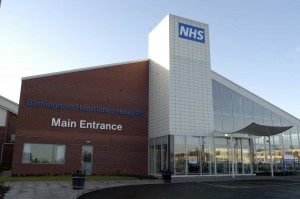 Heart of England NHS Foundation Trust, which runs Birmingham’s Heartlands Hospital, Good Hope Hospital and Solihull Hospital, is urging people to keep safe and keep warm as the area looks set to be hit by a cold snap over the coming days.
Heart of England NHS Foundation Trust, which runs Birmingham’s Heartlands Hospital, Good Hope Hospital and Solihull Hospital, is urging people to keep safe and keep warm as the area looks set to be hit by a cold snap over the coming days.
The Met Office has today issued a Level 3 Cold Weather Alert for the West Midlands meaning there is a 90 per cent probability of severe cold weather/icy conditions over the coming days.
The public is being urged to keep warm and keep safe as temperatures plummet and with extra pressures anticipated at the region’s emergency departments because of the cold weather, locals are reminded to only call the ambulance service in genuine emergencies. A wide range of information and out-of-hours support is available across Birmingham and the West Midlands, aside from the A&E department.
Follow these tips to keep you, your family and those around you warm and well in extremely cold weather:
- Draw your curtains at dusk and keep your doors closed to block out draughts.
- Have regular hot drinks and eat at least one hot meal a day if possible. Eating regularly helps keep energy levels up during winter.
- Wear several light layers of warm clothes (rather than one chunky layer).
- Keep as active in your home as possible.
- Wrap up warm and wear shoes with a good grip on the soles if you need to go outside on cold days as icy pavements and roads can be extremely slippy. The Met Office advises putting grit or cat litter on paths and driveways to lessen the risk of slipping. It adds you should wait until roads have been gritted if you’re travelling by car.
- If you have reduced mobility, are 65 or over, or have a health condition such as heart or lung disease, you should heat your home to at least 18C and make sure you wear enough clothes to stay warm. It’s a good idea to keep your bedroom at this temperature all night.
- Check up on friends, relatives and neighbours who may be more vulnerable to cold weather. Cold weather is especially dangerous for older people or people with serious illnesses, so check in on them if you can.
Kellie Jervis, head of emergency planning at Heartlands Hospital, said: “Severe winter weather leads to an increase in people arriving at hospital with injuries caused by the snow and icy weather conditions, the most common being wrist, ankle and back injuries, so make sure you follow advice such as wearing suitable footwear for the conditions. For example don’t go out to do the bins or feed the birds in your slippers.
“We would also advise people to keep the house warm as we see many hypothermia cases in colder weather. If you have gas heaters in your property, make sure they are properly maintained to help prevent carbon monoxide poisoning. Please also remember there are other alternatives to hospital A&E for minor injuries, slips, trips and falls. You can attend your local walk-in centre, contact your GP or call NHS 111 for free advice.”






